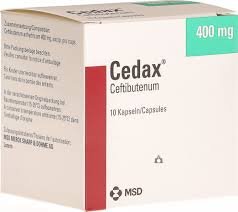Cedax (Ceftibuten) is an orally administered third-generation cephalosporin that is used to treat the following conditions:
- Treatment of mild to moderate acute exacerbations of chronic bronchitis caused by:
- Haemophilus influenzae
- Moraxella catarrhalis (less efficacious)
- Streptococcus pneumoniae.
- Therapy for mild to moderate Medial acute otitis due to bacteria:
- H. influenzae
- M. catarrhalis
- Streptococcus pyogenes.
- It is less efficacious in strep. pneumoniae
- Treatment of minor to moderate tonsillitis and pharyngitis brought on by:
- S. pyogenes.
Ceftibuten Dose in Adults
Note: All ceftibuten formulations have been discontinued for more than 1 year in the United states.
- Use in the management of acute bacterial bronchitis flare-ups:
- For ten days, take 400 mg orally once every day.
- Use in treatment of Acute bacterial otitis media:
- 400 mg orally once a day for 10 days.
- Use in treatment of Pharyngitis and tonsillitis:
- .400 mg once daily for ten days.
Ceftibuten Dose in Children
Note: All ceftibuten formulations have been discontinued for more than 1 year in the United states.
General dosing of Cedax (ceftibuten) in mild to moderate infections:
- Infants, Children, and Adolescents:
- 9 mg/kg/dose orally once a day to a maximum dose of 400 mg/dose
Use of cedax in the treatmnet of acute bacterial exacerbations of Chronic Bronchitis:
- Children older than 12 years of age and Adolescents:
- 400 mg orally once a day for 10 days
Use of cedax in the treatment of acute Otitis media:
Note: Ceftibuten is not advised by the AAP recommendations for the management of acute otitis media.
- Infants older than 6 months and Children less than 12 years of age:
- 9 mg/kg/dose orally once a day for 10 days to a maximum dose of 400 mg/dose
- Children older than 12 years of age and Adolescents:
- 400 mg orally once a day for 10 days
Use of cedax in the treatment of Pharyngitis and tonsillitis:
Note: The IDSA guidelines 2012 do not recommend Ceftibuten as a treatment option for pharyngitis and tonsillitis
- Infants older than 6 months and Children less than 12 years of age:
- 9 mg/kg/dose orally once a day for 10 days to a maximum dose of 400 mg/dose
- Children older than 12 years and Adolescents:
- 400 mg orally once a day for 10 days
Pregnancy Risk Factor B
- Cedax is safe to use during pregnancy, as no adverse fetal outcomes were observed.
Ceftibuten use during breastfeeding:
- Ceftibuten can be excreted in small amounts in breastmilk. However, nursing mothers should still be cautious.
Ceftibuten Dose in Renal Disease:
- CrCl ≥50 mL//minute: Dosage adjustment is not required
- CrCl 30 to 49 mL//minute: 4.5 mg/kg or 200 mg once a day
- CrCl 5 to 29 mL/minute: 2.25 mg per kg or 100 mg once a day
- End-stage renal disease (ESRD) on intermittent hemodialysis (IHD) twice or thrice weekly:
- administer 400 mg or 9 mg/kg/dose to a maximum dose of 400 mg/dose after each hemodialysis session
Ceftibuten Dose in Liver Disease:
The manufacturer has not recommended any dose adjustment in patients with liver disease.
Common Side Effects Of Ceftibuten Include:
- Central nervous system:
- Headache
- Dizziness
- Gastrointestinal:
- Nausea
- Diarrhea
- Dyspepsia
- Loose stools
- Abdominal pain
- Vomiting
- Hematologic & oncologic:
- Eosinophilia
- Decreased hemoglobin
- Change in platelet count
- Hepatic:
- Increased serum ALT
- Increased serum bilirubin
- Renal:
- Increased blood urea nitrogen
Contraindication to Cedax (Ceftibuten) include:
Hypersensitivity to ceftibuten or other cephalosporins or any component of this formulation
Warnings and Precautions
- Penicillin allergy
- Patients who experience IgE-mediated responses like anaphylaxis and gioedema should use ceftibuten with caution.
- Superinfection
- Cefotaxime treatment for longer periods (over 2 months) can lead to superinfections, including fungal or bacterial superinfections. C. difficile-associated diarrhea, (CDAD), and pseudomembranous collitis can occur.
- Colitis
- Patients who have had colitis in the past should be cautious when taking this drug.
- Renal impairment
- Patients with kidney disease must be cautious when using the drug. The dose should also be adjusted.
Ceftibuten: Drug Interaction
Note: Drug Interaction Categories:
- Risk Factor C: Monitor When Using Combination
- Risk Factor D: Consider Treatment Modification
- Risk Factor X: Avoid Concomitant Use
Risk Factor C (Monitor therapy). |
|
| Aminoglycosides | Third generation cephalosporins have the potential to exacerbate the nephrotoxic effects of aminoglycosides. |
| BCG Vaccine (Immunization) | Antibiotics may lessen the benefits of the BCG vaccine (Immunization). |
| Lactobacillus & Estriol | The therapeutic effects of Lactobacillus or Estriol can be diminished by antibiotics. |
| Probenecid | May raise serum levels of cephalosporins. |
| Vitamin K antagonists (eg warfarin) | The anticoagulant effects of Vitamin K antagonists can be enhanced by cephalosporins. |
Risk Factor D (Consider therapy modifications) |
|
| Multivitamins/Minerals (with ADEK, Folate, Iron) | Could reduce the serum concentration of ceftibuten. Ceftibuten absorption may be decreased by the zinc in multivitamins. Treatment: Take oral multivitamins containing zinc at least three hours after taking ceftibuten. |
| Multivitamins/Minerals (with AE, No Iron) | Could reduce the serum concentration of ceftibuten. Ceftibuten absorption may be decreased by the zinc in multivitamins. Treatment: Take oral multivitamins containing zinc at least three hours after taking ceftibuten. |
| Sodium Picosulfate | Antibiotics can reduce the therapeutic effects of Sodium Picosulfate. Patients who are currently using or have just finished using antibiotics should consider using an alternative product to cleanse the bowel before undergoing a colonoscopy. |
| Typhoid Vaccine | The therapeutic effects of Typhoid vaccine may be diminished by antibiotics. The only affected strain is the live attenuated Ty21a. Patients being treated with systemic antibiotics should avoid vaccination with live attenuated Typhoid vaccine (Ty21a). This vaccine should not be used until at least three days after the cessation or discontinuation of antibacterial agent treatment. |
| Zinc Salts | This may cause a decrease in serum Ceftibuten. Management: Oral zinc salts should be administered at least three hours after Ceftibuten. Exceptions: Zinc Chloride. |
Risk Factor X (Avoid Combination) |
|
| BCG (Intravesical). | The therapeutic effects of BCG (Intravesical) may be diminished by antibiotics |
| Cholera Vaccine | Cholera Vaccine may be less effective if taken with antibiotics. Treatment: Cholera vaccine should be avoided in patients who have received systemic antibiotics. |
Monitor:
- Renal functions,
- Hepatic functions, and
- Blood CBC periodically with longer therapy.
- After giving the patient the first dose of Cedax, keep an eye out for any anaphylactic symptoms.
How to take Cedax (Ceftibuten)?
- Do not administer the pill with food.
- The suspension should be administered at least two hours before or one hour after meals. Before using, shake the suspension.
Mechanism of action of Ceftibuten:
Cefotaxime blocks the formation of bacterial proteins, peptidoglycans and penicillin-binding proteins. This eventually leads to cell lysis through the use of autolytic enzymes. It is quickly absorbed and distributedIn the middle ear fluid, bronchial secretions and sputum. The drug accounts for 65%.Protein-boundWith abioavailabilitybetween 75% and 90%, and ahalf-life eliminationChildren: 2 hours, adults: 2.4 hours. Patients with blood pressures between 30 and 49 ml/min can be seen for a further 7.1 hours. Patients with CrCls between 5 and 29 ml/min will finish in 13.4 hours, whereas those with CrCls between 5 and 29 ml/min finish in 22.3 hours. Patients that need 22.3 hours had CrCls between 5 and 5 ml/min. In 2 to 2.6 hours, peak serum concentration can be obtained. 39% of the medication is eliminated through the faeces, whereas 56% is eliminated through the urine.
International Brands of Ceftibuten:
- Butibac
- Caedax
- Cedax
- Ceditax
- Cefaten
- Ceftem
- Idispectra
- Keimax
- Oditen
- Procadex
- Seftem
- Sepex
- Shatbiotic
- Theradicate
Ceftibuten Brands in Pakistan:
|
Ceftibuten [Susp 90 mg/5ml] |
|
| XIGRIS | WILSHIRE LABORATORIES (PVT) LTD. |
|
Ceftibuten [Caps 400 mg] |
|
| XIGRIS | WILSHIRE LABORATORIES (PVT) LTD. |

 for extensive stage small cell lung cancer.webp)


